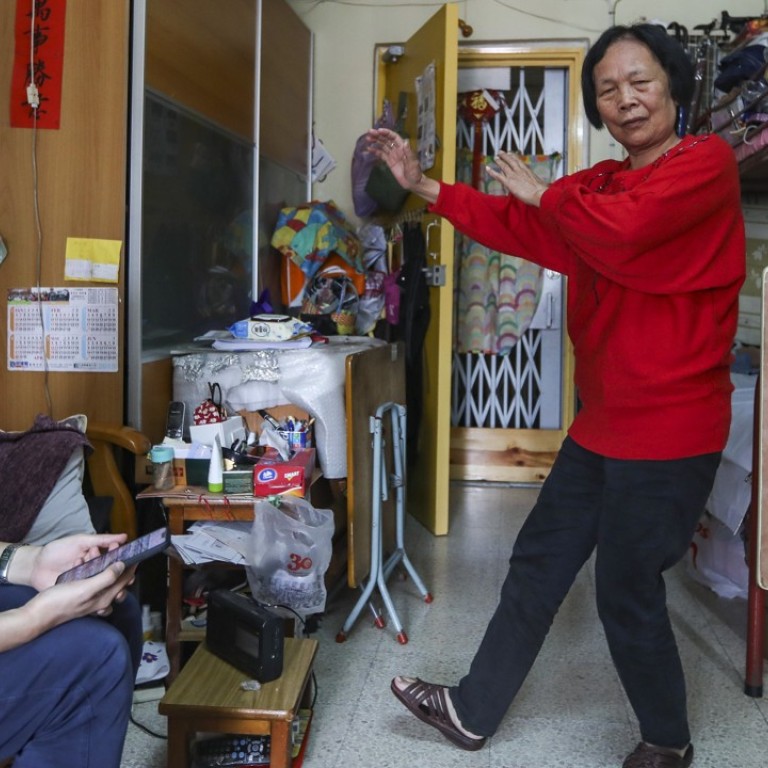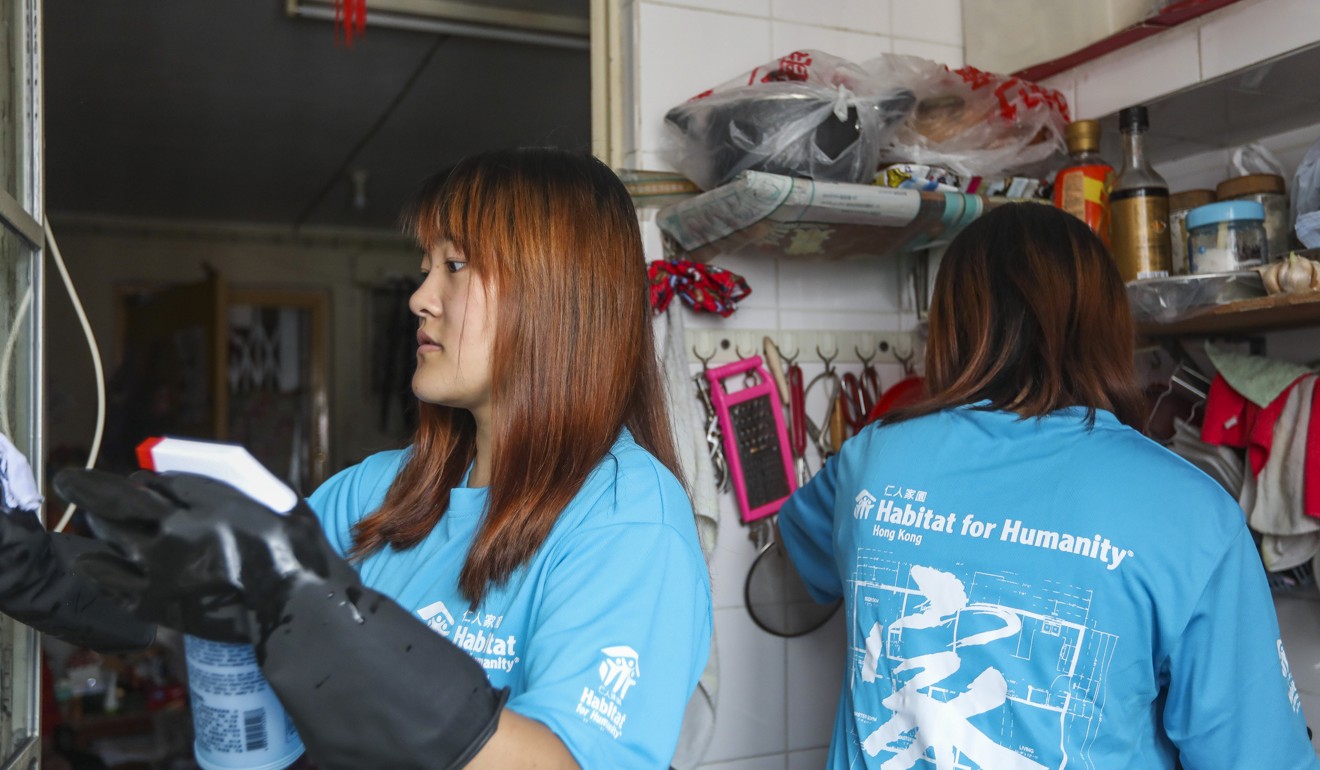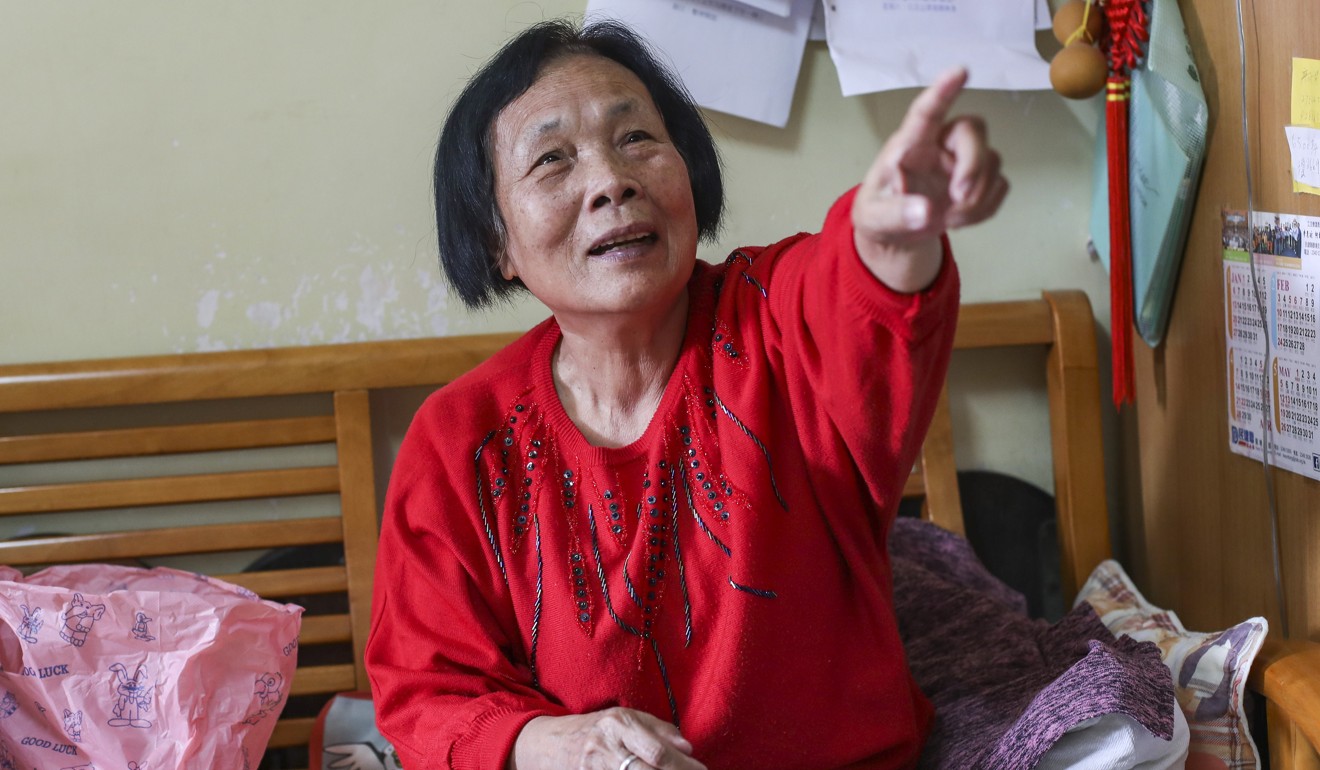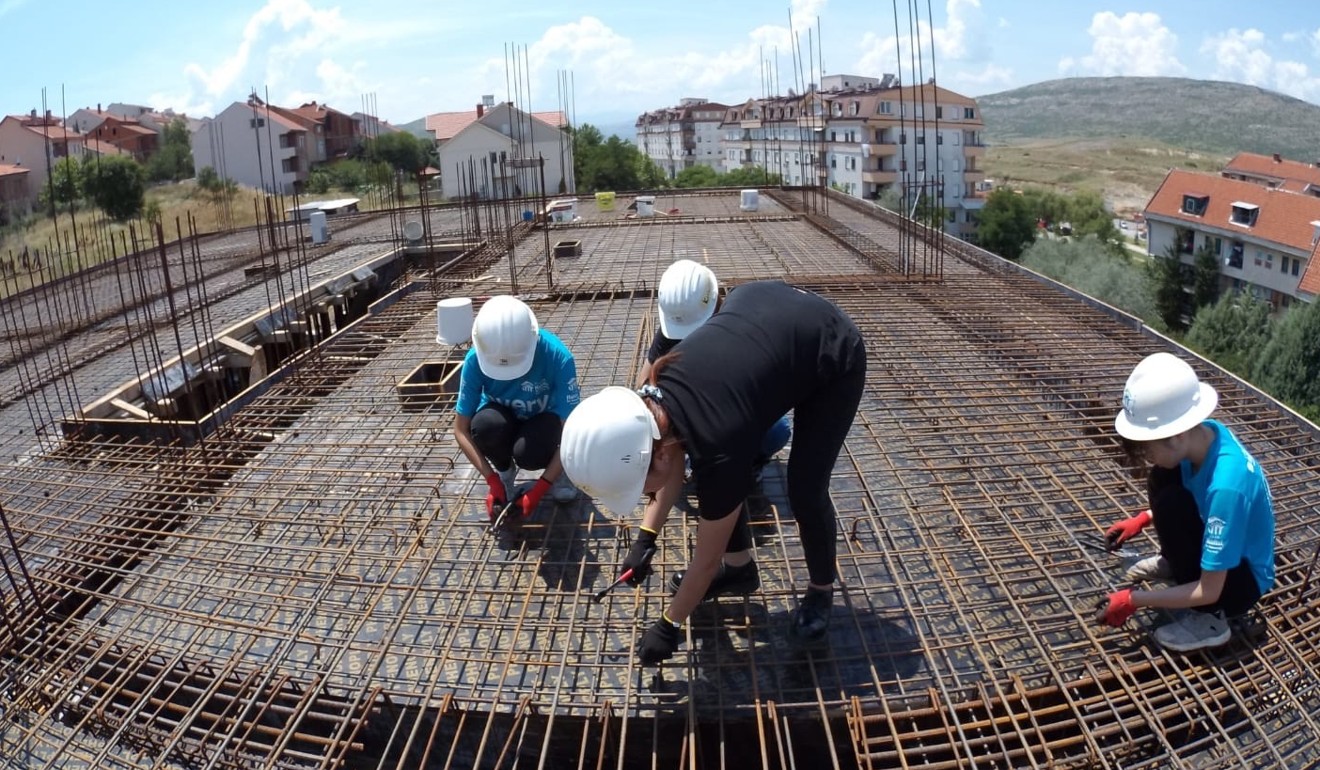
Beyond mopping floors and renovations: Hong Kong elderly and young volunteers connect through Habitat for Humanity’s home services
- Global NGO’s efforts centre on providing visits and free home improvement services for needy in Hong Kong
- Charity’s motto is that ‘everyone deserves a decent place to live’
Ng Sau-fung, 72, opens the door to her one-room flat and gives a welcoming smile.
“I don’t even allow my friends to visit my home, so you’re honoured,” she tells the three young people waiting in the dim corridor.
She knows they are volunteers who have come on a Saturday morning to clean her home. Clearly delighted that they are here, she says with a cheeky glint in her eye: “Just remember I was a professional cleaner most of my life, so my standards are rather high.”
Ng’s flat at Kai Yip Estate in Kowloon Bay is one of 40 households being visited by teams from the NGO Habitat for Humanity Hong Kong.

Kai Yip, a public housing estate, comprises a sprawl of six buildings – concrete slabs containing 4,300 homes – that went into service in 1981, but look like they date back to the 1960s.
The visitors are two visual arts students from the Education University of Hong Kong and a representative from the charity. Their trip to the old estate goes beyond mopping floors and cleaning windows – they give residents a chance to connect with a younger generation.
Volunteers bring much needed Christmas cheer to Hong Kong’s most vulnerable
Ng lets the students into her flat, and they go past a bunk bed crowded with clothes, bags and boxes.
All of the available light streams through the windows of the shower and kitchen area of the flat. There are holes in the concrete ceiling, and the pale yellow paint on the walls is peeling.
Yet somehow, the roughly 200 sq ft space has a comforting, homely feel.
The students break out the mops, buckets and cleaning products. They’ll spend three hours with Ng, scrubbing floors and surfaces, and keeping her company.
Asked about her life, Ng says she had to stop work in 1996 after a back injury that most likely came from years of cleaning city offices.

Her husband suffered a major stroke in 2011, and was confined to a care home until he died in 2015.
“He never came home. I was alone,” Ng says. She had no children or relatives and had to fend for herself.
Calvyn Yeung King-wang, Habitat for Humanity’s communications officer, says Ng is the sort of person the charity hopes to help.
It sends teams of 25 or more volunteers on visits like this on about 30 weekends per year, focused on helping senior citizens and low-income families in government housing.
Sometimes, like at Ng’s flat, the volunteers simply help to clean homes. On other days, with professional help, they renovate dilapidated flats, fixing crumbling concrete and plaster work, and repainting walls and ceilings.
70pc of Hongkongers say they intend to do volunteering work, but fewer took action
According to census data, 44.8 per cent of Hong Kong’s population live in public housing. The Transport and Housing Bureau says that last year, 145,500 public housing flats were “elderly households”, which means all the occupants were aged 60 years or older.
Ng gets by on the government’s Comprehensive Social Security Assistance scheme, which provides her with HK$3,500 per month – her total income. Not that the sum fazes her.
“When I go to yum cha with friends, we spend about HK$24 each,” she says.
To keep cool in the summer she relies on a fan, never turning on her air conditioning. And she does not own a TV set. She keeps her electricity bill at around HK$50 per month.

Habitat for Humanity operates in 70 countries globally. Much of the NGO’s effort goes into “builds”: the construction of homes for the needy. In land-starved Hong Kong, however, the charity is limited to providing visits and free renovation services.
Jo Hayes, CEO of Habitat for Humanity’s Hong Kong operation, says: “Habitat was founded on the principle that everyone deserves a decent place to live.”
Habitat was founded on the principle that everyone deserves a decent place to live
Ng says her husband was a tailor in Tsim Sha Tsui, but in the 1990s, work began drying up. The two were then living in a 60 sq ft “cage home” in Hung Hom.
She says: “The whole flat was just slightly bigger than the bed!” They had a little fridge, but there was no space for a table or furniture. They ate dinner sitting on the bed.
In 1996, as their total monthly income slid below HK$8,000 (US$1,022), the couple became eligible for government housing and moved into Kai Yip Estate.
It was a major step up in their quality of life. “We then had a table to eat from, and cupboards for our things,” Ng says, gesturing to her furniture. “We were very happy.”
Habitat for Humanity projects in Hong Kong building a better future
Volunteers Katherine Ho Yee-ting and Rose Tsui Shiu-man are in their second year studying visual arts at Education University. They are regular volunteers with Habitat for Humanity. As well as visiting households citywide, this year they took part in a 12-day home-building project in Macedonia, where they learned construction skills such as bricklaying, bending rebar and mixing cement.
After the visit to Ng’s home, Tsui, 19, says she thinks their presence was appreciated, and that she has plenty to learn from the retiree. “You could see she enjoyed our visit, and chatting about daily life. She told us all sorts of tips for saving water and electricity.”
Volunteering, both students agree, gives them a feeling of purpose they cannot achieve from other pastimes.
Volunteer team has helped 4,000 needy Hong Kong families fix up their homes
“A warm home is really important for people who are no longer working,” Ho, 20, says. “Volunteering this way feels meaningful. And I learned a lot about having a positive attitude towards life from Ms Ng.”
As for Ng, she insists she is doing just fine living on her own.
Her bad back is much better since she learned to swim at the public pools in Kwun Tong and Kowloon Park. “It is a miracle,” she says, explaining that she chose not to have surgery.
It was a physiotherapist who suggested she start swimming.
“I swam for an hour a day for two years,” she says. “After that, I could walk without problems.”
She gets up to demonstrate the tai chi movements she has been learning, and her young visitors clap.
“Oh, it’s nothing yet, I’m just a student too,” she says. “But if I decide to do something, I want to be the best.”

